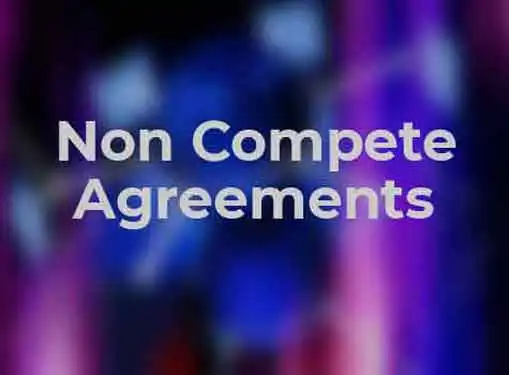Legal Information for Entrepreneurs
Non Compete Agreement
You've decided a non-compete agreement is an absolute necessity for your business. But creating a legally enforceable non-compete agreement isn't as easy as it sounds. Here's what you need to know.
A non-compete agreement safeguards your business from unfair or even predatory competitive business practices.

Without a robust non-compete agreement, you could invest tons of resources and proprietary knowledge training in an employee and then watch helplessly as the employee jumps ship to work for a competitor.
Highly competitive industries make non-compete agreements a non-negotiable condition of employment. But the inclusion of an arbitrary paragraph in an employment contract won't necessarily provide the protection your company needs when key employees leave the organization. To protect your interests, you'll need to make sure your non-compete clauses and agreements have legal enforceability.
A legally enforceable non compete agreement has specific execution and content requirements. Although it's critical to submit your agreement to attorney review, here are some of the considerations involved with legally airtight non-compete agreements.
- Reasonable justification. Non-compete agreements have more legal footing when the employer has a justifiable reason for its existence. If the courts view the existence of a non-compete agreement simply as a punishment or deterrent to discourage employees from leaving the company, its legal enforceability is in jeopardy.
- Transactional basis. Employees should receive some kind of benefit in exchange for signing a non-compete agreement. If signing a non-compete agreement is a condition of employment, the job itself may meet benefit requirements. But to compensate existing or exiting employees, you'll need to offer a pay increase or severance package in exchange for a signature.
- Geographic range. A good non-compete agreement specifies a territory or geographic range. The employee may be permitted to pursue employment or contracting opportunities outside of this range, provided they don't solicit business from your current customers.
- Specific activities. From a legal perspective, you don't have the right to prohibit an exiting employee from seeking gainful employment in his field. However, the non-compete clause can describe specific activities and knowledge uses that the employee cannot engage in during the non-compete period. The more specifics you can provide, the easier it is to legally enforce the agreement.
- Limited duration. Non-compete agreements can't be applied indefinitely. Legally, your non-compete agreements must describe a reasonable timeframe, usually between six months and two years. In practice, most non-compete agreements include a one-year restriction against competitive activities.
Share this article
Additional Resources for Entrepreneurs



Conversation Board
We greatly appreciate any advice you can provide on this topic. Please contribute your insights on this topic so others can benefit.